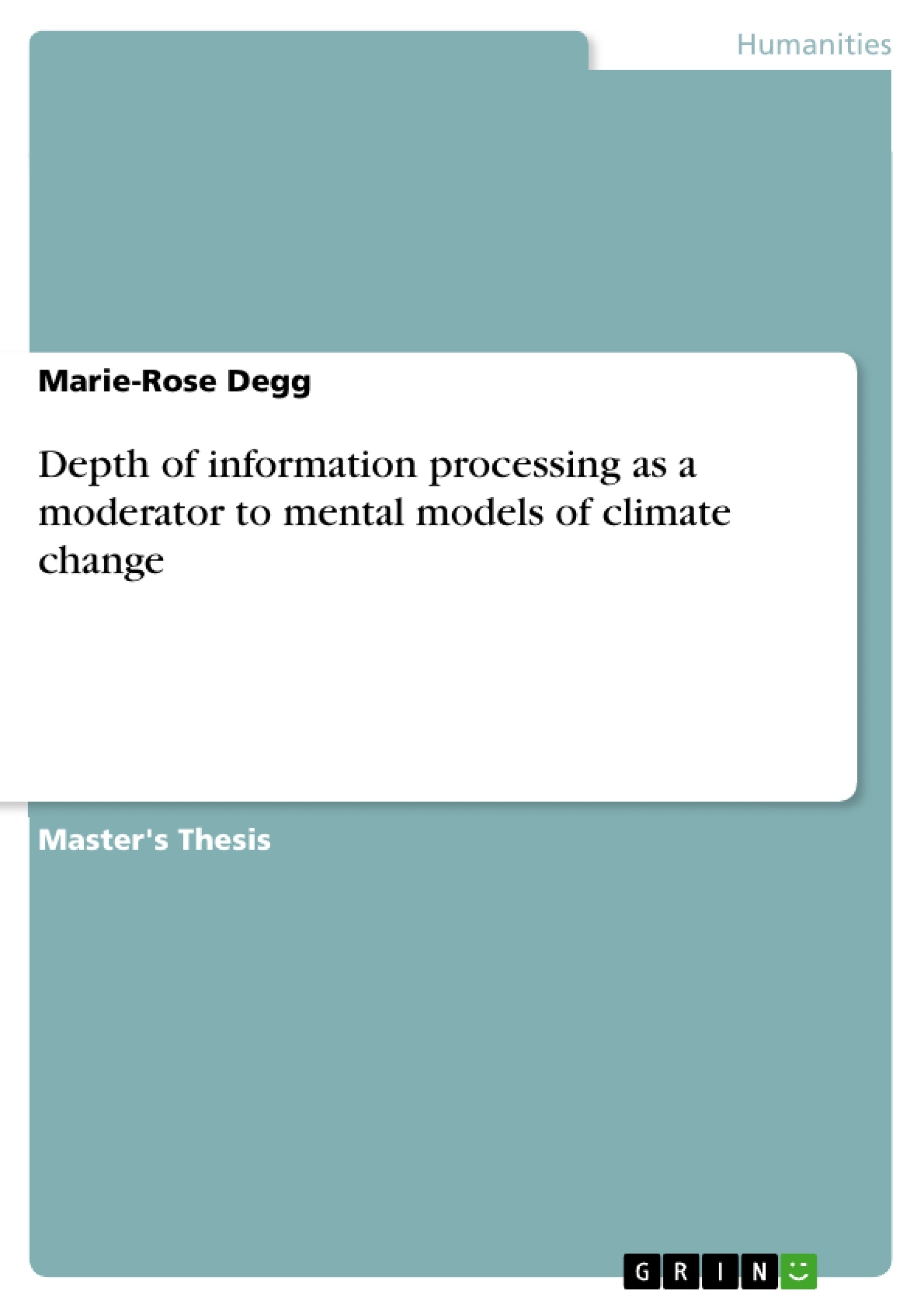
Depth of information processing as a moderator to mental models of climate change
Masterarbeit, 2017
48 Seiten, Note: 1,5
Leseprobe
Inhaltsverzeichnis (Table of Contents)
- Introduction
- Theoretical background
- The carbon cycle
- The climate system
- Climate change
- Public beliefs about climate change
- Stock-flow processes
- Aim of this study and hypotheses
- Method
- Participants
- Task description
- Results
- Preliminary analyses
- Results regarding demographic variables
- Ordinal data
- Binary data
- Results regarding the hypotheses
- Qualitative analysis
- Discussion
Zielsetzung und Themenschwerpunkte (Objectives and Key Themes)
This study investigates the relationship between depth of information processing and mental models of climate change. The goal is to understand how people's understanding of stock-flow processes, particularly in relation to climate change, is influenced by the depth of information they process. The study seeks to identify potential barriers to accurate understanding of the climate system and to explore the effectiveness of interventions designed to promote deeper processing of information.
- Mental models of climate change
- Stock-flow processes and understanding of accumulation
- The impact of information processing depth on climate change understanding
- Cognitive heuristics and their role in climate change decision-making
- The significance of public understanding for climate change policy
Zusammenfassung der Kapitel (Chapter Summaries)
The first chapter provides an introduction to the topic of climate change, emphasizing its global significance and the urgency of addressing it. It highlights the role of the public's understanding of climate change in shaping policy decisions. The second chapter delves into the theoretical background, exploring the carbon cycle, the climate system, and the scientific consensus on climate change. It further examines public beliefs about climate change and introduces the concept of stock-flow processes, a crucial framework for understanding climate change dynamics. The third chapter outlines the methodology used in the study, detailing the participants, the task description, and the experimental design. The fourth chapter presents the results of the study, including analyses of participant demographics, performance on the stock-flow task, and the impact of information processing depth on the participants' understanding of climate change. The fifth chapter discusses the implications of the findings, drawing connections between the results, the theoretical framework, and previous research.
Schlüsselwörter (Keywords)
This study explores the connection between mental models of climate change, stock-flow processes, and the depth of information processing. Key terms include: climate change, accumulation, mental models, global warming, information processing, correlation heuristic, and carbon dioxide emissions. The study examines how people's understanding of these concepts influences their perception of climate change and their ability to make informed decisions regarding climate policy.
Frequently Asked Questions
What are stock-flow processes in the context of climate change?
Stock-flow processes refer to how inflows (emissions) and outflows (uptake) of carbon dioxide accumulate in a stock (the atmosphere) over time.
Why do people struggle to understand climate change dynamics?
Research shows that many people have poor mental models of accumulation, often using heuristics like "pattern matching" instead of understanding the underlying system.
Does providing information about the dangers of climate change improve understanding?
According to this study, giving participants information about the dangers did not increase their performance in predicting CO2 emission trajectories.
What is the "correlation heuristic" in climate decision-making?
It is a cognitive shortcut where people incorrectly assume that the output (atmospheric CO2) should look exactly like the input (emissions).
What was the performance level in the stock-flow experiment?
The performance was generally low, with more than half of the participants failing to choose the correct trajectories for emissions and uptake.
Details
- Titel
- Depth of information processing as a moderator to mental models of climate change
- Hochschule
- Universität Kassel (Center for Environmenal Systems Research)
- Note
- 1,5
- Autor
- Marie-Rose Degg (Autor:in)
- Erscheinungsjahr
- 2017
- Seiten
- 48
- Katalognummer
- V448864
- ISBN (eBook)
- 9783668834798
- ISBN (Buch)
- 9783668834804
- Sprache
- Englisch
- Schlagworte
- depth
- Produktsicherheit
- GRIN Publishing GmbH
- Preis (Ebook)
- US$ 20,99
- Preis (Book)
- US$ 29,99
- Arbeit zitieren
- Marie-Rose Degg (Autor:in), 2017, Depth of information processing as a moderator to mental models of climate change, München, Page::Imprint:: GRINVerlagOHG, https://www.diplomarbeiten24.de/document/448864
- Autor werden
- Ihre Optionen
- Vertriebskanäle
- Premium Services
- Autorenprofil
- Textarten und Formate
- Services für Verlage, Hochschulen, Unternehmen

- © GRIN Publishing GmbH.
- Alle Inhalte urheberrechtlich geschützt. Kopieren und verbreiten untersagt.
- info@grin.com
- AGB
- Open Publishing
Der GRIN Verlag hat sich seit 1998 auf die Veröffentlichung akademischer eBooks und Bücher spezialisiert. Der GRIN Verlag steht damit als erstes Unternehmen für User Generated Quality Content. Die Verlagsseiten GRIN.com, Hausarbeiten.de und Diplomarbeiten24 bieten für Hochschullehrer, Absolventen und Studenten die ideale Plattform, wissenschaftliche Texte wie Hausarbeiten, Referate, Bachelorarbeiten, Masterarbeiten, Diplomarbeiten, Dissertationen und wissenschaftliche Aufsätze einem breiten Publikum zu präsentieren.
Kostenfreie Veröffentlichung: Hausarbeit, Bachelorarbeit, Diplomarbeit, Dissertation, Masterarbeit, Interpretation oder Referat jetzt veröffentlichen!
- GRIN Verlag GmbH
-
- Nymphenburger Str. 86
- 80636
- Munich, Deutschland
- +49 89-550559-0
- +49 89-550559-10
- info@grin.com
-









